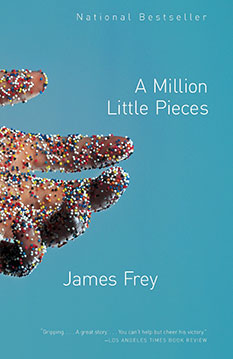
When I first heard that Oprah Windy was going to interview James Frey, author of the memoir, A Million Little Pieces, that she was angry and felt betrayed because Mr. Frey’s account appeared to deviate significantly from the truth, that she was going to haul him onto the carpet and call him to account in a million little living rooms across America—when I heard all this righteous indignation rising up from the south—I chalked it up to another instance of maudlin-sappy-slightly-self-indulgent-Oprah-strutting. Immediately, a million little reasons came to mind why her indignation should go ignored. But with time for reflection, I found myself reluctantly agreeing. However, instead of calling Mr. Frey to account for a lapse of honesty, I would prefer to question his lapse of authenticity. First, check out a nice summary of the Frey scandal on The Voice of America web site. Mr. Frey’s mendacious tendencies first came to light on The Smoking Gun web site. This has attracted considerable vilification. For example, the blog, The Real Ugly American [site no longer exists] calls him a “liar fraud and scumbag.”
First, let me be truthful: I have no great love for Oprah Windy’s human-spirit-triumphs-over-every-adversity brand of 19th century Romantic schmaltz. In some respects, it is as dishonest and inauthentic as Mr. Frey. Worse even, for the Oprah shtick commits the added sin of being irrelevant: it tries to dredge up a pastel-hued vision of the world that died more than a century ago.
Now, let me list a million (or at least a handful of) different reasons why we might safely ignore the divine Ms. O:
1. Elsewhere I have detailed the deconstruction of authorship. The author is a distinctively modern creature of western culture who thrives most peculiarly on American soil where individual achievement (e.g. writing books) is valorized over common effort (e.g. creating culture). And yet it is dishonest to heap so much credit upon the author. How much of any book can truly be ascribed to its author? Did the author invent the language? the medium? the form?
2. In the same way, we can deconstruct the notion of a book, or, to lend the project more precision, the notion of a form of book called the memoir. We might say that in the very act of writing our recollections, we commit an act of interpretation which imposes upon the account a rhetorical layer which looks a lot like fiction. We take what was once out there—the facts of the matter—and we draw them inside; we interpret them; we internalize them; and then we set them down. Even writing which purports to be objective—news reporting, like the Wall Street Journal, say, or The Smoking Gun—cannot help but present a gloss upon the facts. We often fail to recognize how far we have strayed from the facts because we share with the authors a view of the world so deeply embedded that we cannot even imagine a position from which an alternate point of view might begin to hold sway in our minds.
3. In connection with the ideal of authorship, I often find myself shouting out “Intentional fallacy!” At such moments, I find myself looking to the text as the sole criterion. I don’t care what the book says, I tell myself; all I care about is how the book says it. Is the writing any good? If James Frey is a good writer, all is forgiven.
4. Where is the harm? Who has been wronged? These are the memoirs of a rogue, a type of the American psyche. Why should we be surprised, then, when he proves to be precisely the character he claims to be—thoroughly untrustworthy?
But perhaps James Frey has done harm after all. The Voice of America article alludes to the harm when quoting Sharon O’Brien, a professor at Dickson College and author of The Family Silver, a memoir about her struggles with depression: “Whether it’s addiction or depression or mental illness, there can be this sense of community, someone’s telling my story, and I feel less alone. The kind of readers he was attracting could have been counting on the truthfulness, because these are often subjects that could be difficult to discuss.” Arthur Frank puts the matter in terms of witnessing. An authentic experience of adversity, whether it be illness or addiction or poverty, seeks to integrate the experience into the fabric of one’s living; it becomes part of one’s identity. The challenge of integration moves in two directions: one seeks to draw experience into one’s self, while at the same time offering one’s self to experience. Integrative living imposes an ethical demand. It is an ethic of service, a regard for the other. It is the look beyond one’s self into a world of need, and then an answer to that need. The ethical demand for an answer to the need of others is what drives the illness narrative, the memoir. The clean and sober ex-addict tells his story, not only to assist in his own therapy, but also as a response to those around him who appear to totter at the brink. He writes to caution them, to support them, to guide them back from the edge. If he seizes the opportunity to do some good, then perhaps there is redemption. Perhaps, then, he can justify his suffering.
But Frey has nothing, just as he gives nothing. Maybe there remains the possibility of redemption. Maybe, one day, he will publish another memoir: the story of a reformed inauthentic man.
Maybe nothing. Maybe Frey and Oprah conspired to manufacture a publishing phenomenon.